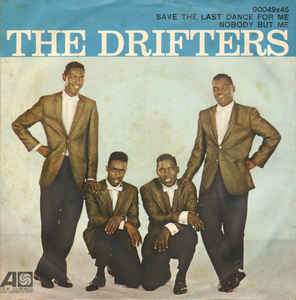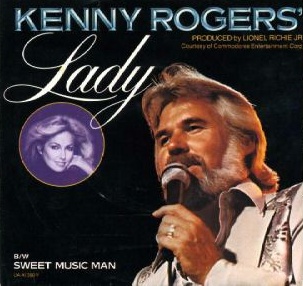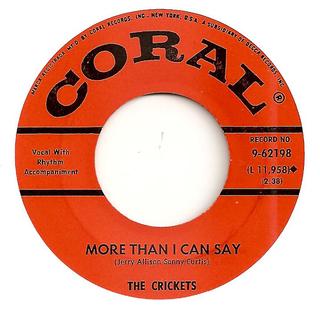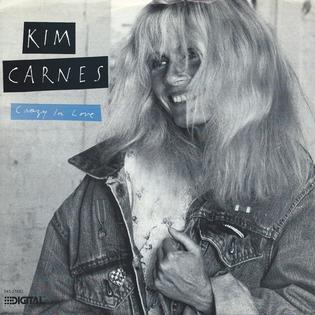Related Research Articles

"Islands in the Stream" is a song written and later recorded by the Bee Gees. It was sung by American country music artists Kenny Rogers and Dolly Parton. It was released in August 1983 as the first single from Rogers's album Eyes That See in the Dark. Named after the Ernest Hemingway novel, it was originally written for Marvin Gaye in an R&B style, only later to be changed for the Kenny Rogers album.
"From a Distance" is a song written in 1985 by American singer-songwriter Julie Gold. Gold was working as a secretary at the time for HBO and writing songs in her free time. Gold's friend, Christine Lavin, introduced the song to Nanci Griffith, who first recorded it for her 1987 album, Lone Star State of Mind.
"¿Quién será?" is a bolero-mambo written by Mexican composer Pablo Beltrán Ruiz. Beltrán recorded the song for the first time with his orchestra in 1953. Pedro Infante, for whom the song was written, recorded it in 1954.
The Adult Contemporary chart is published weekly by Billboard magazine and lists the most popular songs on adult contemporary radio stations in the United States. The chart is compiled based on airplay data submitted to Billboard by stations that are members of the Adult Contemporary radio panel. The chart debuted in Billboard magazine on July 17, 1961. Over the years, the chart has gone under a series of name changes, being called Easy Listening(1961–1962; 1965–1979), Middle-Road Singles(1962–1964), Pop-Standard Singles(1964–1965), Hot Adult Contemporary Tracks(1979–1982) and Adult Contemporary(1983–present).

"If" is a song written by American singer-songwriter David Gates in 1971. Originally popularized by his group Bread, the song charted at No. 4 on the U.S. Billboard Hot 100 when released as a single in 1971 and No. 6 in Canada. The song also spent three weeks at No. 1 on the U.S. Easy Listening chart, and one week at the top of the Canadian AC chart.

"Shop Around" is a song originally recorded by The Miracles on Motown Records' Tamla subsidiary label. It was written by Miracles lead singer Smokey Robinson and Motown Records founder Berry Gordy. It became a smash hit in 1960 when originally recorded by The Miracles, reaching number one on the Billboard R&B chart, number one on the Cashbox Top 100 Pop Chart, and number 2 on the Billboard Hot 100 chart. It was The Miracles first million-selling hit record, and the first-million-selling hit for the Motown Record Corporation. This landmark single was a multiple award winner for The Miracles, having been inducted into the Grammy Hall of Fame in 2006, inducted into The Rock and Roll Hall of Fame as one of The 500 Songs That Shaped Rock and Roll, and honored by Rolling Stone as #500 in their list of The 500 Greatest Songs of All Time.

"Angel of the Morning" is a popular song written by Chip Taylor and recorded by many artists, most notably by Merrilee Rush, P. P. Arnold, Connie Eaton, Mary Mason, Guys 'n' Dolls, Melba Montgomery, Olivia Newton-John and Juice Newton.

"Three Times a Lady" is a 1978 song by American soul group the Commodores for their album Natural High, written by lead singer Lionel Richie. It was produced by James Anthony Carmichael and the Commodores.

"Save the Last Dance for Me" is a song written by Doc Pomus and Mort Shuman, first recorded in 1960 by the Drifters, with Ben E. King on lead vocals.

"She Believes In Me" is a song recorded by American country music singer Kenny Rogers. It was released in April 1979 as the second single from his album The Gambler. The song was written and first recorded by Steve Gibb.
"(There's) Always Something There to Remind Me" is a song written in the 1960s by songwriting team Burt Bacharach and Hal David. Originally recorded as a demo by Dionne Warwick in 1963, "(There's) Always Something There to Remind Me" first charted for Lou Johnson whose version reached No. 49 on the Billboard Hot 100 in the summer of 1964.

"Woman in Love" is a song performed by Barbra Streisand and taken from her 1980 album, Guilty. The song was written by Barry and Robin Gibb of the Bee Gees, who received the 1980 Ivor Novello award for Best Song Musically and Lyrically. It is her fourth of four Platinum records, and is considered her greatest international hit.
"Together Again" is a 1964 song by United States country singer and guitarist Buck Owens.

"Lady" is a song written by Lionel Richie and first recorded by American country music artist Kenny Rogers. It was released in September 1980 on the album Kenny Rogers' Greatest Hits.

Julie Rogers is an English pop singer. She is best known for her multi-million selling song, "The Wedding".
"Am I That Easy to Forget" is the title of a popular song written by country music singer Carl Belew and W.S. Stevenson and published in 1958. Belew recorded his song in Nashville on December 17, 1958, and released the single in March 1959, where it reached number nine on the U.S. country music chart. Other country music artists who have recorded cover versions of the song include: Skeeter Davis ; Ernest Tubb (1960); Gene Vincent (1966); George Jones (1967); Patti Page (1968); Jim Reeves ; and Prairie Oyster (1991).

"More Than I Can Say" is a song written by Sonny Curtis and Jerry Allison, both former members of Buddy Holly's band the Crickets. They recorded it in 1959 soon after Holly's death and released it in 1960. Their original version hit No. 42 on British Record Retailer Chart in 1960. It has been notably performed by singers Bobby Vee, Leo Sayer, and Sammy Kershaw.
"Sad Movies " is a 1961 pop song by the American singer Sue Thompson. The song was written by John D. Loudermilk and appears on Thompson's 1962 Hickory Records album Meet Sue Thompson.
"I Love You Because" is a song written and recorded by country music singer and songwriter Leon Payne in 1949. The song has been covered by several artists throughout the years, including hit cover versions by Al Martino in 1963 and Jim Reeves in 1964.

"Crazy in Love" is a song by songwriters Even Stevens and Randy McCormick; it was first recorded by Joe Cocker on his 1984 album Civilized Man. The song was covered by American pop artist Kim Carnes in 1988 and released as the second single from her album View from the House, it peaked at number 13 on the Billboard Hot Adult Contemporary Tracks chart and number 68 on the Billboard Hot Country Singles & Tracks chart.
References
- 1 2 3 Hyatt, Wesley (1999). The Billboard Book of #1 Adult Contemporary Hits (Billboard Publications), page 29.
- ↑ "Austriancharts.at – Julie Rogers – The Wedding" (in German). Ö3 Austria Top 40.
- ↑ "Dutchcharts.nl – Julie Rogers – The Wedding" (in Dutch). Single Top 100.
- ↑ "Julie Rogers: Artist Chart History". Official Charts Company.
- ↑ "Julie Rogers Chart History (Hot 100)". Billboard.
- ↑ "Julie Rogers Chart History (Adult Contemporary)". Billboard.
- ↑ "Offiziellecharts.de – Julie Rogers – The Wedding". GfK Entertainment Charts. To see peak chart position, click "TITEL VON Julie Rogers"